PHUKET'S sea gypsies have achieved recognition and a promising cultural centre will open soon. But the future is not as bright for those north of Phuket, in Ranong.
THEY live in stilted shacks built on a mud flat above piles of oyster shells, broken glass and rubbish, their nomadic days on the seas of South-East Asia gone forever.
Liya Pramongkit, an elder and mid-wife of Thailand's largest group of Moken-speaking sea gypsies, saw her people on the small island of Koh Lao dying at the rate of one a week, many of them starving mothers and babies.
''We have lost our traditional way of life as our children no longer hear the stories that have been handed down by our ancestors,'' Liya Pramongkit says, her deeply lined face showing the hardship the Mokens have suffered since they were forced to leave their seafaring lives, where the only things that mattered were the tides, the fish, the storms, the moon and the sea spirits.
''Before, when we lived and died on the sea, life was much better,'' she says.
More than three decades working in Bangkok's slums did not prepare Catholic priest Joe Maier for what he saw on Koh Lao when he made his first 30-minute boat ride here from the Thai fishing port of Ranong, in south-west Thailand, four years ago.
''The people were literally starving to death, trapped between the modern world and the Moken world,'' Father Maier says. ''I have never seen people as poor,'' he says.
''The women did not have milk in their breasts to feed their babies and everyone had [intestinal] worms ??? there were no traditional values ... it was a matter of basic survival.''
For centuries home for the Moken were hand-built boats called kabang, which they plied through the Mergui Archipelago where 800 islands are scattered along 400 kilometres of the coasts of Burma and Thailand, in the Andaman Sea.
They lived on fish, molluscs, sandworms and oysters, accumulating little and living on land only during the monsoons.
But massively depleted fishing stocks, the declaration of marine reserves and crackdowns on itinerant fishers in Burma forced them off their boats into an uncertain future where they are struggling to survive in a Thai world they barely know, at first shunted from one island to another and now exploited by unscrupulous merchants capitalising on their ability to dive deep into the sea.
The men are hired for weeks at a time to work on large fishing boats, earning less than $200 a month.
They have little knowledge of the value of money and are often robbed of their earnings or get drunk and lose it when they come ashore, leaving their families with nothing.
Some of them, including teenagers, are paid by so-called ''agents'' to collect sea cucumbers and shells, diving up to 30 metres with a face mask connected to a garden hose.
Someone on a boat above pushes an old fashioned bicycle pump to provide air.
They are also paid to use homemade explosives to blast fish to the surface, a dangerous and illegal practice that destroys pristine coral reefs.
Many suffer the bends after coming to the surface too quickly.
About 85 families of an estimated 6000 ethnic Mokens have settled permanently on Koh Lao, an island where they have sought refuge from the monsoons and buried their dead for decades.
They are recognised by the Thai government, which provides some health benefits and education but they do not have citizenship.
They still have no running water or toilets in their shacks which do not have walls or windows.
Father Maier's Human Development Foundation and Mercer Centre runs a school in a shack on the island for 129 Moken children, where they learn to count in Thai, Moken and English and where a daily meal and healthcare are provided.
The foundation has also built tanks to provide clean water.
Father Maier, a 72-year-old American Redemptorist priest who arrived in Bangkok's Klong Toey slums in 1972, says the Mokens have lost their traditions and culture because they have been ''too busy just trying to survive''.
But he wants to revive the culture of the people whose roots are unclear but probably migrated from southern China thousands of years ago.
The foundation plans to rebuild derelict kabang boats and to have old Moken people come to sit with the children to teach them the old stories about the sea and the sea spirits.
''Now that they have a bit to eat we can go back to the old people and find out what they know,'' Father Maier says.
Nursery rhymes are now taught to the children in Thai but the teachers aim to learn the Moken children's stories, so they teach them.
Despite their parents spending most of their lives on the sea, many of the children cannot swim.
''We'll teach them ... we can do this,'' Father Maier says.
But now a new threat has emerged for the Moken on Koh Lao from people claiming they own the island and who have demanded they leave.
Two months ago 60 of the children staged a protest vigil outside a police station on the mainland during which they pleaded with the police not to evict their families from Koh Lao.
The dispute has forced the foundation and local authorities to build a new school on mudflats which Father Maier says ''the community owns and they cannot make us leave here''.
Liya Pramongkit says her people do not want to leave Koh Lao because here they are safe from Burmese authorities, who have pursued them relentlessly for illegal fishing.
Up to 20 of the Moken men on Koh Lao have been in Burmese jails at the same time, serving sentences of up to two years.
''Just to pass through Burmese waters we have to pay Burmese soldiers,'' she says.
''We are afraid of them.''
This article first appeared in the Sydney Morning Herald and is reprinted by permission of the author.
THEY live in stilted shacks built on a mud flat above piles of oyster shells, broken glass and rubbish, their nomadic days on the seas of South-East Asia gone forever.
Liya Pramongkit, an elder and mid-wife of Thailand's largest group of Moken-speaking sea gypsies, saw her people on the small island of Koh Lao dying at the rate of one a week, many of them starving mothers and babies.
''We have lost our traditional way of life as our children no longer hear the stories that have been handed down by our ancestors,'' Liya Pramongkit says, her deeply lined face showing the hardship the Mokens have suffered since they were forced to leave their seafaring lives, where the only things that mattered were the tides, the fish, the storms, the moon and the sea spirits.
''Before, when we lived and died on the sea, life was much better,'' she says.
More than three decades working in Bangkok's slums did not prepare Catholic priest Joe Maier for what he saw on Koh Lao when he made his first 30-minute boat ride here from the Thai fishing port of Ranong, in south-west Thailand, four years ago.
''The people were literally starving to death, trapped between the modern world and the Moken world,'' Father Maier says. ''I have never seen people as poor,'' he says.
''The women did not have milk in their breasts to feed their babies and everyone had [intestinal] worms ??? there were no traditional values ... it was a matter of basic survival.''
For centuries home for the Moken were hand-built boats called kabang, which they plied through the Mergui Archipelago where 800 islands are scattered along 400 kilometres of the coasts of Burma and Thailand, in the Andaman Sea.
They lived on fish, molluscs, sandworms and oysters, accumulating little and living on land only during the monsoons.
But massively depleted fishing stocks, the declaration of marine reserves and crackdowns on itinerant fishers in Burma forced them off their boats into an uncertain future where they are struggling to survive in a Thai world they barely know, at first shunted from one island to another and now exploited by unscrupulous merchants capitalising on their ability to dive deep into the sea.
The men are hired for weeks at a time to work on large fishing boats, earning less than $200 a month.
They have little knowledge of the value of money and are often robbed of their earnings or get drunk and lose it when they come ashore, leaving their families with nothing.
Some of them, including teenagers, are paid by so-called ''agents'' to collect sea cucumbers and shells, diving up to 30 metres with a face mask connected to a garden hose.
Someone on a boat above pushes an old fashioned bicycle pump to provide air.
They are also paid to use homemade explosives to blast fish to the surface, a dangerous and illegal practice that destroys pristine coral reefs.
Many suffer the bends after coming to the surface too quickly.
About 85 families of an estimated 6000 ethnic Mokens have settled permanently on Koh Lao, an island where they have sought refuge from the monsoons and buried their dead for decades.
They are recognised by the Thai government, which provides some health benefits and education but they do not have citizenship.
They still have no running water or toilets in their shacks which do not have walls or windows.
Father Maier's Human Development Foundation and Mercer Centre runs a school in a shack on the island for 129 Moken children, where they learn to count in Thai, Moken and English and where a daily meal and healthcare are provided.
The foundation has also built tanks to provide clean water.
Father Maier, a 72-year-old American Redemptorist priest who arrived in Bangkok's Klong Toey slums in 1972, says the Mokens have lost their traditions and culture because they have been ''too busy just trying to survive''.
But he wants to revive the culture of the people whose roots are unclear but probably migrated from southern China thousands of years ago.
The foundation plans to rebuild derelict kabang boats and to have old Moken people come to sit with the children to teach them the old stories about the sea and the sea spirits.
''Now that they have a bit to eat we can go back to the old people and find out what they know,'' Father Maier says.
Nursery rhymes are now taught to the children in Thai but the teachers aim to learn the Moken children's stories, so they teach them.
Despite their parents spending most of their lives on the sea, many of the children cannot swim.
''We'll teach them ... we can do this,'' Father Maier says.
But now a new threat has emerged for the Moken on Koh Lao from people claiming they own the island and who have demanded they leave.
Two months ago 60 of the children staged a protest vigil outside a police station on the mainland during which they pleaded with the police not to evict their families from Koh Lao.
The dispute has forced the foundation and local authorities to build a new school on mudflats which Father Maier says ''the community owns and they cannot make us leave here''.
Liya Pramongkit says her people do not want to leave Koh Lao because here they are safe from Burmese authorities, who have pursued them relentlessly for illegal fishing.
Up to 20 of the Moken men on Koh Lao have been in Burmese jails at the same time, serving sentences of up to two years.
''Just to pass through Burmese waters we have to pay Burmese soldiers,'' she says.
''We are afraid of them.''
This article first appeared in the Sydney Morning Herald and is reprinted by permission of the author.

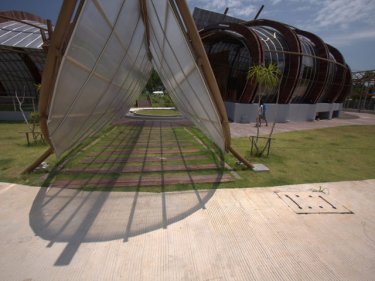



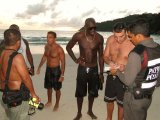


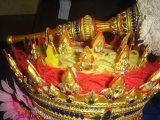
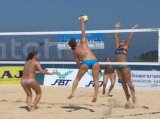
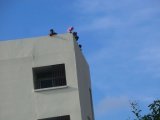
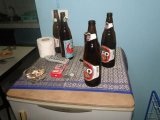



Quite sad this... All those years of living from the sea, sailing the glorious tropical islands of the Andaman and now living in slum.
You can just imagine how wonderful their lives used to be...
Posted by Sean on May 22, 2012 19:58